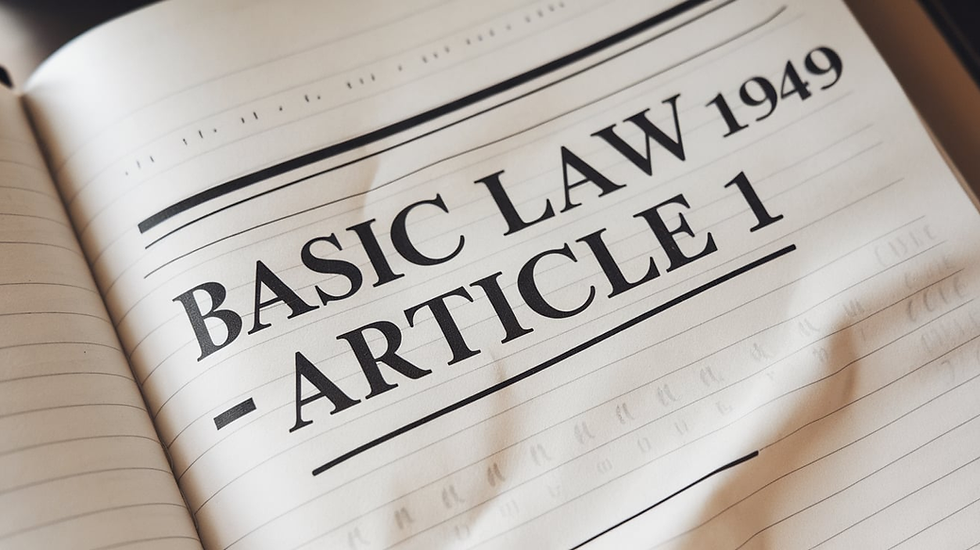Basic Law 1949 | Article 1
- WLD Team

- Dec 25, 2025
- 4 min read
The Basic Law for the Federal Republic of Germany (1949) is the country’s constitutional foundation. It was adopted after World War II, during a time when Germany needed to rebuild trust, democracy, and respect for human rights.
At the heart of this document is Article 1, which declares that human dignity is inviolable. This article sets the tone for all other laws in Germany and places human rights at the highest level of constitutional protection.
More than just symbolic, it has real legal power—German courts, lawmakers, and government agencies must always respect and protect human dignity.

Basic Law 1949 Article 1 – The Text
Article 1 of the Basic Law (1949) states:
“Human dignity shall be inviolable. To respect and protect it shall be the duty of all state authority.”
“The German people therefore acknowledge inviolable and inalienable human rights as the basis of every community, of peace and of justice in the world.”
“The following basic rights shall bind the legislature, the executive, and the judiciary as directly applicable law.”
This means:
Human dignity is absolute and cannot be violated by the state or individuals.
Human rights are fundamental and form the basis of peace and justice.
All branches of government are bound by these rights and must uphold them in every action.
Basic Law 1949 Article 1 – Importance
Article 1 is considered the most important part of the German Constitution. Its importance lies in:
Moral Foundation: It is a direct response to the abuses of human rights during the Nazi regime.
Legal Strength: Courts can strike down any law that violates human dignity.
Universal Values: It aligns Germany with international human rights standards, such as the Universal Declaration of Human Rights (1948).
Democratic Identity: It makes respect for individuals the foundation of the German Republic.
Without Article 1, the Basic Law would not have the strong human rights protection that defines modern Germany.
Basic Law 1949 Article 1 – Historical Context
To understand why Article 1 is so central, we must look at its history:
Nazi Period (1933–1945): Human dignity and rights were completely disregarded. Millions suffered persecution and genocide.
Post-War Germany: When drafting the Basic Law in 1949, leaders wanted to ensure such abuses could never happen again.
International Influence: The article was inspired by both Christian traditions and modern human rights documents like the UN Declaration of Human Rights.
Thus, Article 1 became the moral and legal response to Germany’s darkest past.
Basic Law 1949 Article 1 – Human Dignity in Practice
The phrase “Human dignity shall be inviolable” has real meaning in daily life:
Criminal Law: Prisoners must be treated with respect and cannot be subjected to degrading punishment.
Welfare Rights: Citizens have the right to a minimum standard of living to maintain dignity.
Privacy: Surveillance and data collection are restricted to protect personal dignity.
End-of-Life Issues: Debates about euthanasia and medical treatment often reference Article 1.
For example, in a 2006 ruling, the German Federal Constitutional Court struck down a law allowing the military to shoot down hijacked airplanes. The court held that sacrificing innocent passengers would violate their human dignity under Article 1.
Basic Law 1949 Article 1 – Equality and Human Rights
Article 1 links dignity to human rights. It ensures:
Rights cannot be taken away, even by majority vote.
All people, regardless of race, religion, gender, or origin, are entitled to equal dignity.
Government institutions must actively protect citizens from violations.
This principle means that even unpopular minorities are fully protected under the law.
Basic Law 1949 Article 1 – Binding Nature
One of the most powerful parts of Article 1 is that it makes human rights binding law:
The Legislature (Parliament) cannot pass laws that harm dignity.
The Executive (Government) cannot enforce policies against dignity.
The Judiciary (Courts) must strike down actions or laws that do not respect dignity.
This ensures that human dignity is not just an ideal but an enforceable standard across all branches of government.
A Practical Example of Basic Law 1949 Article 1
An example is the Hartz IV welfare system case. The Constitutional Court ruled that benefits must guarantee a “dignified minimum existence.” Even though welfare levels can be debated, the state must always provide enough support to respect human dignity. This shows how Article 1 directly impacts social policy.
Conclusion
Article 1 of the Basic Law (1949) is not only the opening of the German Constitution but also its heart. By declaring human dignity inviolable and binding all state power to respect it, this article sets the highest legal and moral standard.
It reflects lessons from history, aligns Germany with international human rights, and ensures that democracy protects every individual. More than any other rule, Article 1 defines Germany’s identity as a nation built on human dignity and justice.
FAQs
What does Article 1 of the German Basic Law say?
It declares that human dignity is inviolable, human rights are fundamental, and all state authority must respect and protect them.
Why is Article 1 of the Basic Law important?
It is important because it ensures that human dignity is above all other legal and political considerations, protecting individuals against state abuse.
Can Article 1 of the Basic Law be changed?
No. Article 1 is part of the “eternity clause” in Article 79(3), meaning it cannot be amended or abolished.
How does Article 1 affect German law?
It binds Parliament, government, and courts. Any law or policy violating dignity can be struck down by the Constitutional Court.
What is an example of Article 1 in practice?
A 2006 ruling struck down a law allowing hijacked planes to be shot down, as it violated the dignity of passengers. This shows dignity is always protected.

Comments